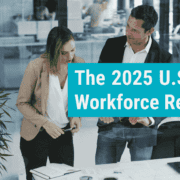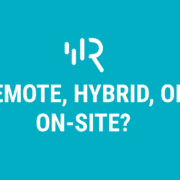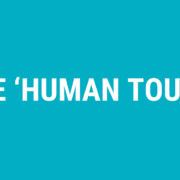AI’s Role in Modern Hiring Practices
The Future of Recruitment
The future of recruitment is being revolutionized by artificial intelligence (AI), transforming the hiring process in numerous ways. AI-powered applicant tracking systems (ATS) enable companies to manage job openings efficiently and sift through a vast pool of applicants. Chatbots and virtual recruiters are streamlining the application process, providing instant responses to candidate queries, and automating repetitive tasks.
Below, you’ll learn about how AI and recruitment can work together and some challenges worth noting.
Understanding Algorithms and Data Points
Algorithms are sets of rules and calculations that guide AI-powered systems to perform specific tasks. In recruitment, these algorithms analyze various data points to identify patterns, trends, and correlations that help assess and select the most suitable candidates.
One of the key applications of AI in recruitment is the use of AI-powered Applicant Tracking Systems (ATS). These systems automate tasks such as resume screening and candidate assessment. By using algorithms, ATS can process and analyze a large volume of resumes, searching for specific keywords and qualifications that match the job description.
AI-powered ATS can also assess candidates’ skills and qualifications more objectively and accurately. By analyzing data points from assessments, interviews, and performance metrics, algorithms can identify candidates who are likely to be a good fit for the position.
Additionally, AI-powered systems can source candidates from a wider pool of resources, including online job platforms and professional networks, resulting in better candidate sourcing. After all, computers are great at managing large data sets. It also addresses one issue in standard recruiting: bias.
Using AI To Reduce Unconscious Biases
Unconscious bias remains a formidable challenge in hiring, leading to disparities and inequities. However, artificial intelligence (AI) can be a powerful tool that can help mitigate bias in candidate screening.
One of the more direct ways AI reduces bias is through checking job descriptions. For example, if a local fire department looks for a fireman, the system might correct you to a firefighter, so you can use it to overcome gender biases. This might discourage skilled females from pursuing traditionally male-dominated positions.
Racial biases can also be overcome through AI. For example, a hiring manager might have racial discrimination against black-sounding names, which is a huge problem preventing some amazing candidates from getting good work. AI systems tend to focus on what’s important: a candidate’s skills.
There might also be a bias from the internal data a company gathers. Some AI systems rely on a combination of outside and inside data, which is good, as it helps you accept new and fresh ideas. Meanwhile, old-fashioned internal processes might be more repetitive, hiring many of the same candidates. Modern AIs can be trained to avoid this issue.
Despite the advancements in AI, it’s also guilty of bias, requiring human intervention. Human oversight allows for a holistic evaluation, considering factors that AI may not account for, such as cultural nuances or shared experiences. By involving recruiters in decision-making, organizations can ensure that AI effectively reduces bias and promotes diversity rather than inadvertently reinforcing existing prejudices.
AI also has its hands in the interview process.
Chatbots and Virtual Interviews
Chatbots and virtual interviews provide efficient and effective ways to screen and assess potential candidates.
Chatbots, powered by artificial intelligence, are transforming how recruiters interact with candidates. They can deliver answers to complex questions, interpret queries, ask for more details, and even create their own solutions based on known documents and processes. This saves recruiters time and ensures consistent and accurate responses to candidates.
Virtual interviews, conducted through video platforms, have become increasingly popular for evaluating candidates remotely. AI-powered software can analyze these video interviews to determine a candidate’s confidence, honesty, and communication skills. AI can provide valuable insights that human interviewers might overlook by analyzing gestures, facial expressions, and data patterns.
This technology is particularly beneficial when dealing with a large number of applicants. AI can analyze video and chat interviews efficiently, allowing recruiters to focus on the most qualified candidates and pare down the pool of applicants.
Forecasting Candidate Success
Predictive analytics offers powerful insights into candidate success and longevity. AI can accurately forecast a candidate’s potential job performance and longevity by analyzing data collected from job applications, assessments, and previous hires.
Here are some examples of how that might work:
1) Identifying the best-fit candidates through patterns
Leveraging big data, AI algorithms can identify patterns and correlations that human recruiters might miss. This allows organizations to make more informed decisions and prioritize candidates likely to thrive in a particular role. By considering factors such as education, experience, skills, and personality traits, predictive analytics helps recruiters identify the best-fit candidates with the highest likelihood of success.
2) Efficient, unbiased recruiting
Predictive analysis ensures a more efficient and effective recruitment process by matching candidates to specific job requirements. This approach saves time, reduces the chance of making biased decisions, and increases the likelihood of finding the right candidate for the role.
3) Predictions on how long an employee will stay
By predicting a candidate’s longevity within an organization, recruiters can identify individuals who are more likely to stay and contribute to the company’s long-term success. This ultimately reduces turnover costs, improves employee retention, and fosters a more stable and productive workforce.
4) Identifying skills
AI algorithms can identify key skills and experience needed for a job by analyzing data from previous successful hires in similar roles. By considering multiple data points, AI can provide valuable predictions on a candidate’s potential performance, allowing organizations to make smarter and more objective hiring decisions.
But despite how great AI sounds, it also comes with concerns.
Challenges and Ethical Considerations
As organizations increasingly rely on AI algorithms to streamline their hiring processes, it is crucial to acknowledge the challenges and ethical considerations associated with these technological advancements. We’ve touched on a few topics related, but here’s a quick list of challenges AI needs to overcome:
- Influenced Data: If the algorithms are trained on biased data or if the data used to train them reflects historical patterns of discrimination, there is a risk that the algorithms will perpetuate and amplify existing biases.
- Data Security: AI algorithms require access to vast amounts of personal data, including candidates’ resumes, interview recordings, and online profiles. Ensuring the protection of this data is essential to maintain trust and comply with privacy regulations.
- Human Balance: Human recruiters play a crucial role in interpreting and evaluating the AI-generated insights and providing a human touch to the candidate experience.
- Lawful Concerns: AI algorithms should be designed to comply with anti-discrimination laws and ensure equal opportunities for all candidates. Regular monitoring, auditing, and transparency in AI hiring can help mitigate potential biases and ensure fairness.
How Rainmakers Fits In
While AI has the potential to revolutionize the hiring process, it is essential to balance technological advancements with fair hiring practices. Organizations must address the challenges and ethical considerations related to bias, data privacy, human involvement, and compliance with labor laws and equal opportunity regulations.
Of course, AI has many benefits, including reducing human bias and helping you identify the best candidate. For now, AI-supported, human-centric hiring practices offer the best of both worlds.
But if you want the best of both worlds for your sales team, join Rainmakers to see how we can integrate with your ATS.










